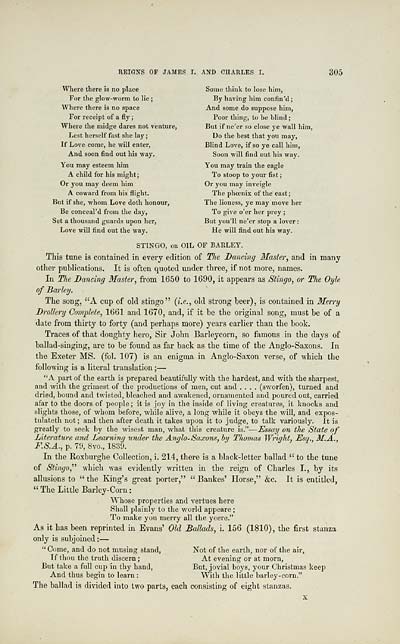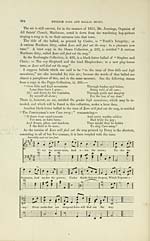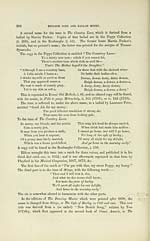Glen Collection of printed music > Printed text > Popular music of the olden time > Volume 1
(339) Page 305 - Stingo, or Oil of barley
Download files
Complete book:
Individual page:
Thumbnail gallery: Grid view | List view

REIGNS OF JAMES I. AND CHARLES I.
305
Where there is no place
For the glow-worm to lie ;
Where there is no space
For receipt of a fly ;
Where the midge dares not venture,
Lest herself fast she la}' ;
If Love come, he will enter,
And soon find out his way.
You may esteem him
A child for his might;
Or you may deem him
A coward from his flight.
But if she, whom Love doth honour,
Be conceal'd from the day.
Set a thousand guards upon her,
Love will find out the way.
Some think to lose him,
By having him confin'd;
And some do suppose him,
Poor thing, to be blind ;
But if ne'er so close ye wall him,
Uo the best that you may.
Blind Love, if so ye call him.
Soon will find out his way.
You may train the eagle
To stoop to your fist ;
Or you may inveigle
The phoenix of the east ;
The lioness, ye may move her
To give o'er her prey ;
But you'll ne'er stop a lover :
He will find out his way.
STINGO, on OIL OF BARLEY.
This tune is contained in every edition of Tlie Dancing Master, and in many
other publications. It is often quoted under three, if not more, names.
In The Dancing Master, from 1650 to 1690, it appears as Stingo, or The Ogle
of Barley.
The song, "A cup of old stingo" (i.e., old strong beer), is contained in Merry
Drollery Complete, 1661 and 1670, and, if it be the original song, must be of a
date from thirty to forty (and perhaps more) years earlier than the book.
Traces of that doughty hero, Sir John Barleycorn, so famous in the days of
ballad-singing, are to be found as far back as the time of the Anglo-Saxons. In
the Exeter MS. (fol. 107) is an enigma in Anglo-Saxon verse, of Avhich the
following is a literal translation ; —
"A part of the earth is prepared beautifully with the hardest, and with the sharpest,
and with the grimest of the productions of men, cut and .... (sworfen), turned and
dried, bound and twisted, bleached and awakened, ornamented and poured out, carried
afar to the doors of people ; it is joy in the inside of living creatures, it knocks and
slights those, of whom before, while alive, a long while it obeys the will, and expos-
tulateth not ; and then after death it takes upon it to judge, to talk variously. It is
greatly to seek by the wisest man, what this creature is."- — Essay on the State of
Literature and Learning under the Anglo-Saxons, by Thomas Wright, Esq., M.A.,
F.S.A., p. 79, 8vo., 1839.
In the Roxburghe Collection, i. 214, there is a black-letter ballad " to the tune
of Stingo," which was evidently -written in the reign of Charles I., by its
allusions to " the King's great porter," " Eankes' Horse," &c. It is entitled,
"The Little Barley-Corn:
Whose properties and vertues here
Shall plainly to the world appeare ;
To make you merry all the yeere."
As it has been reprinted in Evans' Old Ballads, i. 156 (1810), the first stanza
only is subjoined : —
" Come, and do not musing stand, Not of the earth, nor of the air,
If thou the truth discern ; At evening or at morn.
But take a full cup in thy hand. But, jovial boys, your Christmas keep
And thus begin to learn : With the little barley-corn."
The ballad is divided into two parts, each consisting of eight stanzas.
X
305
Where there is no place
For the glow-worm to lie ;
Where there is no space
For receipt of a fly ;
Where the midge dares not venture,
Lest herself fast she la}' ;
If Love come, he will enter,
And soon find out his way.
You may esteem him
A child for his might;
Or you may deem him
A coward from his flight.
But if she, whom Love doth honour,
Be conceal'd from the day.
Set a thousand guards upon her,
Love will find out the way.
Some think to lose him,
By having him confin'd;
And some do suppose him,
Poor thing, to be blind ;
But if ne'er so close ye wall him,
Uo the best that you may.
Blind Love, if so ye call him.
Soon will find out his way.
You may train the eagle
To stoop to your fist ;
Or you may inveigle
The phoenix of the east ;
The lioness, ye may move her
To give o'er her prey ;
But you'll ne'er stop a lover :
He will find out his way.
STINGO, on OIL OF BARLEY.
This tune is contained in every edition of Tlie Dancing Master, and in many
other publications. It is often quoted under three, if not more, names.
In The Dancing Master, from 1650 to 1690, it appears as Stingo, or The Ogle
of Barley.
The song, "A cup of old stingo" (i.e., old strong beer), is contained in Merry
Drollery Complete, 1661 and 1670, and, if it be the original song, must be of a
date from thirty to forty (and perhaps more) years earlier than the book.
Traces of that doughty hero, Sir John Barleycorn, so famous in the days of
ballad-singing, are to be found as far back as the time of the Anglo-Saxons. In
the Exeter MS. (fol. 107) is an enigma in Anglo-Saxon verse, of Avhich the
following is a literal translation ; —
"A part of the earth is prepared beautifully with the hardest, and with the sharpest,
and with the grimest of the productions of men, cut and .... (sworfen), turned and
dried, bound and twisted, bleached and awakened, ornamented and poured out, carried
afar to the doors of people ; it is joy in the inside of living creatures, it knocks and
slights those, of whom before, while alive, a long while it obeys the will, and expos-
tulateth not ; and then after death it takes upon it to judge, to talk variously. It is
greatly to seek by the wisest man, what this creature is."- — Essay on the State of
Literature and Learning under the Anglo-Saxons, by Thomas Wright, Esq., M.A.,
F.S.A., p. 79, 8vo., 1839.
In the Roxburghe Collection, i. 214, there is a black-letter ballad " to the tune
of Stingo," which was evidently -written in the reign of Charles I., by its
allusions to " the King's great porter," " Eankes' Horse," &c. It is entitled,
"The Little Barley-Corn:
Whose properties and vertues here
Shall plainly to the world appeare ;
To make you merry all the yeere."
As it has been reprinted in Evans' Old Ballads, i. 156 (1810), the first stanza
only is subjoined : —
" Come, and do not musing stand, Not of the earth, nor of the air,
If thou the truth discern ; At evening or at morn.
But take a full cup in thy hand. But, jovial boys, your Christmas keep
And thus begin to learn : With the little barley-corn."
The ballad is divided into two parts, each consisting of eight stanzas.
X
Set display mode to: Large image | Transcription
Images and transcriptions on this page, including medium image downloads, may be used under the Creative Commons Attribution 4.0 International Licence unless otherwise stated. ![]()
| Special collections of printed music > Glen Collection of printed music > Printed text > Popular music of the olden time > Volume 1 > (339) Page 305 - Stingo, or Oil of barley |
|---|
| Permanent URL | https://digital.nls.uk/91371515 |
|---|
| Shelfmark | Glen.254 |
|---|---|
| Additional NLS resources: | |
| Attribution and copyright: |
|
| Description | Scottish songs and music of the 18th and early 19th centuries, including music for the Highland bagpipe. These are selected items from the collection of John Glen (1833 to 1904). Also includes a few manuscripts, some treatises, and other books on the subject. |
|---|
| Description | The Glen Collection and the Inglis Collection represent mainly 18th and 19th century Scottish music, including Scottish songs. The collections of Berlioz and Verdi collected by bibliographer Cecil Hopkinson contain contemporary and later editions of the works of the two composers Berlioz and Verdi. |
|---|

